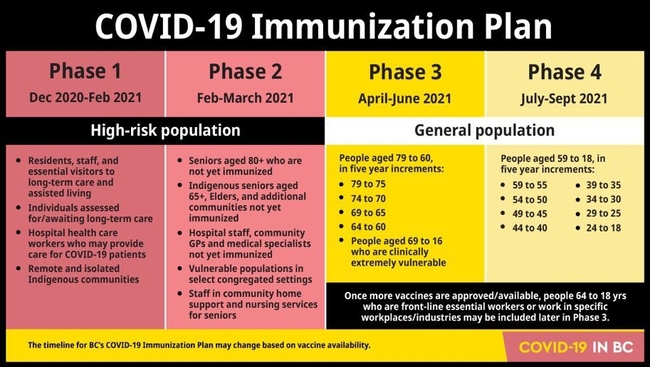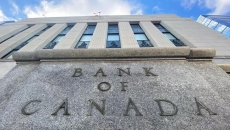British Columbia's oldest residents will be able to pre-register for COVID-19 vaccinations starting in March after the most vulnerable groups have been immunized under a provincial plan announced today.
Watch live as we announce the next steps to protect people with our COVID-19 vaccine rollout plan.https://t.co/xvUuaroNHA
— John Horgan (@jjhorgan) January 22, 2021
People who register for the age-based plan will get a reminder to book appointments when eligible, but provincial health officer Dr. Bonnie Henry says timelines for vaccination will depend on available doses.
Residents in long-term care homes and health-care workers who look after them are among those who are currently being vaccinated, followed in February by more residents of Indigenous communities as well as those who are over the age of 80.
Those aged 75 to 79 will be vaccinated starting in April as part of the pre-registration strategy that will also include people with underlying health conditions before those in younger age groups are immunized.
Everyone who is vaccinated will get a record of their immunization and a reminder of their second dose by text, email or phone call.
The aim is to administer vaccines to 4.3 million eligible residents by September using larger facilities including school gyms, arenas and mobile clinics, as well as home visits for those who are unable to attend a clinic.
B.C.'s COVID-19 immunization plan B.C.'s four-phased COVID-19 Immunization Plan is based on scientific evidence, as well as expert advice and guidance from the National Advisory Committee on Immunization, B.C.'s Immunization Committee, and B.C.'s public health leadership committee.

At every step, it is focused on protecting those who are most vulnerable to severe illness. Phase 1 (current phase)
Timeline: December 2020 to February 2021 * Residents and staff in long-term care facilities * Individuals assessed for and awaiting long-term care * Residents and staff of assisted-living residences * Essential visitors to long-term care facilities and assisted-living residences * Health-care workers providing care for COVID-19 patients in settings like intensive care units, emergency departments, paramedics, medical units and surgical units * Remote and isolated Indigenous communities
Phase 2 Timeline: February to March 2021 * Seniors aged 80+ who are not immunized in Phase 1 * Indigenous (First Nations, Métis and Inuit) seniors age 65 and over, and Elders and additional Indigenous communities not immunized in Phase 1 * Hospital staff, community general practitioners and medical specialists not immunized in Phase 1 * Vulnerable populations living and working in select congregated settings * Staff in community home support and nursing services for seniors
Phase 3 - General population immunization Timeline: April to June 2021 *Timeline may change based on vaccine availability People aged 79 to 60, in five-year increments (D1 = first dose/D2 = second dose) * Aged 79-75; D1: April/D2: May * Aged 74-70, D1: April/D2: May * Aged 69-65; D1: May or June/D2: June or July * Aged 64-60; D1: June/D2: July * Aged 69-16 who are clinically extremely vulnerable; D1/D2 April - June Note: As additional vaccines are approved and become available, people who are front-line essential workers or work in specific workplaces or industries may also be able to start receiving vaccines later in Phase 3 and into Phase 4.
Phase 4 Timeline: July to September 2021 *Timeline may change based on vaccine availability People aged 59 to 18, in five-year increments: (D1 = first dose/D2 = second dose) * Aged 59 to 55; D1: July/D2: August * Aged 54 to 50; D1: July/D2: August * Aged 49 to 45; D1: July/D2: August * Aged 44 to 40; D1: July/D2: August * Aged 39 to 35; D1: July or August/D2: August or September * Aged 34 to 30; D1: August/D2: September * Aged 29 to 25; D1: August or September/D2: September * Aged 24 to 18; D1/D2:
September Immunization for clinically extremely vulnerable individuals British Columbians aged 69 to 16 with the following conditions will be eligible for earlier immunization in Phase 3, as they are deemed clinically extremely vulnerable: * solid organ transplant recipients * people with specific cancers: * people with cancer who are undergoing active chemotherapy * people with lung cancer who are undergoing radical radiotherapy * people with cancers of the blood or bone marrow such as leukemia, lymphoma or myeloma who are at any stage of treatment * people having immunotherapy or other continuing antibody treatments for cancer * people having other targeted cancer treatments that can affect the immune system, such as protein kinase inhibitors or PARP (Poly (ADP-ribose) polymerase) inhibitors * people who have had bone marrow or stem-cell transplants in the last six months or who are still taking immunosuppression drugs * people with severe respiratory conditions, including all cystic fibrosis, severe asthma and severe chronic obstructive pulmonary disease * people with rare diseases that significantly increase the risk of infections (such as severe combined immunodeficiency, homozygous sickle cell disease) * people on immunosuppression therapies enough to significantly increase risk of infection (biologic modifiers, high-dose steroids, AZT, cyclophosphamide) * people who had a splenectomy (spleen removed) * adults with very significant developmental disabilities that increase risk (details to come) * adults on dialysis or with chronic kidney disease (Stage 5) * women who are pregnant with significant heart disease, congenital or acquired * significant neuromuscular conditions requiring respiratory support


.jpg)



